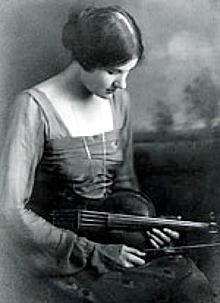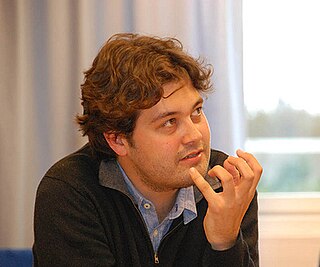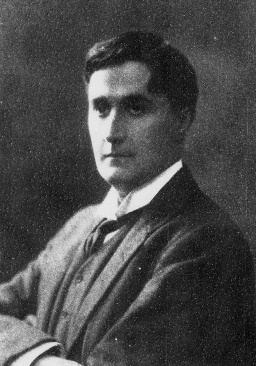Related Research Articles

The viola ( vee-OH-lə, Italian:[ˈvjɔːla,viˈɔːla]) is a string instrument of the violin family, and is usually bowed when played. Violas are slightly larger than a violin, it has a lower and deeper sound. Since the 18th century, it has been the middle or alto voice of the violin family, between the violin (which is tuned a perfect fifth higher) and the cello (which is tuned an octave lower). The strings from low to high are typically tuned to C3, G3, D4, and A4.

Ralph Vaughan Williams was an English composer. His works include operas, ballets, chamber music, secular and religious vocal pieces and orchestral compositions including nine symphonies, written over sixty years. Strongly influenced by Tudor music and English folk-song, his output marked a decisive break in British music from its German-dominated style of the 19th century.

Lionel Tertis, CBE was an English violist. He was one of the first viola players to achieve international fame, and a noted teacher.

A string orchestra is an orchestra consisting solely of a string section made up of the bowed strings used in Western Classical music. The instruments of such an orchestra are most often the following: the violin, which is divided into first and second violin players, the viola, the cello, and usually, but not always, the double bass.

Rebecca Helferich Clarke was a British classical composer and violist. Internationally renowned as a viola virtuoso, she also became one of the first female professional orchestral players in London.

A viola concerto is a concerto contrasting a viola with another body of musical instruments such as an orchestra or chamber music ensemble. Throughout music history, especially during the Baroque, Classical, Romantic eras, viola was viewed mostly as an ensemble instrument. Though there were a few notable concertos written for the instrument in this time period, these instances were quite rare and the instrument continued to be ignored. However, during the 20th century, the instrument was revitalized thanks to the work of a number of violists and composers, which led to the commission and composition of many more viola concertos, expanding the repertoire significantly.
Songs of Travel is a song cycle of nine songs originally written for baritone voice composed by Ralph Vaughan Williams, with poems drawn from the Robert Louis Stevenson collection Songs of Travel and Other Verses. A complete performance of the entire cycle lasts between 20 and 24 minutes.
Flos Campi: Suite for Solo Viola, Small Chorus, and Small Orchestra is a composition by the English composer Ralph Vaughan Williams, completed in 1925. Its title is Latin for "flower of the field." It is neither a concerto nor a choral piece, although it prominently features the viola and a wordless choir. The piece is divided into six movements, played without pause, each headed by a verse from the Song of Solomon:
- Sicut Lilium inter spinas (Lento)
- Jam enim hiems transiit
- Quaesivi quem diligit anima mea
- En lectulum Salomonis
- Revertere, revertere Sulamitis!
- Pone me ut signaculum
Roger Steptoe is an English composer and pianist. He studied music at the University of Reading as an undergraduate and then at the Royal Academy of Music, London, from 1974 to 1977 as a post-graduate student. There he studied composition with Alan Bush and piano accompaniment with Geoffrey Pratley.
Richard Henry Walthew, often known as Richard H. Walthew was an English composer and pianist, and an important figure in English chamber music during the first half of the 20th century.

Lawrence Power is a British violist, born 1977, noted both for solo performances and for chamber music with the Nash Ensemble and Leopold String Trio.
The Suite for Viola and Orchestra by Ralph Vaughan Williams is a work in eight movements for solo viola and orchestra composed in 1933 and 1934. The Suite is dedicated to violist Lionel Tertis, who premiered the work on November 12, 1934 at the Queen's Hall in London under the baton of Malcolm Sargent. A typical performance lasts about 23 minutes.
Frederick Craig Riddle OBE was a British violist. He was considered to be in the line from Lionel Tertis and William Primrose, through to the violists of today such as Lawrence Power.
Matthew Jones is a British violist, violinist and composer primarily known for his international performance work as a soloist, recitalist and chamber musician. He also holds a Viola Professorship and is Head of Chamber Music at Guildhall School of Music and Drama, and runs an in-demand performance health consultancy practice. He is fluent in Italian.
Six Studies in English Folk Song is a piece of chamber music written by English composer Ralph Vaughan Williams in 1926. It is a collection of six English folk songs set for cello and piano. Each song follows the same format: presentation of the tune in the solo line, followed by a full iteration of the folk song in the piano with an ornamented solo line.

The Lark Ascending is a short, single-movement work by the English composer Ralph Vaughan Williams, inspired by the 1881 poem of the same name by the English writer George Meredith. It was originally for violin and piano, completed in 1914, but not performed until 1920. The composer reworked it for solo violin and orchestra after the First World War. This version, in which the work is chiefly known, was first performed in 1921. It is subtitled "A Romance", a term that Vaughan Williams favoured for contemplative slow music.
Bernard Shore was an English viola player and author.
Harry Danks, (1912-2001) was a British violist and principal viola of the BBC Symphony Orchestra from 1946 to 1978. He was the founder and director of the London Consort of Viols.
Timothy Ridout is a British violist and 1st Prizewinner of the prestigious Lionel Tertis International Viola Competition.
References
- ↑ "Letters of Ralph Vaughan Williams, Letter No. VWL2188" . Retrieved 22 February 2022.
- ↑ Martinson, Kenneth. "Ralph Vaughan Williams" (PDF). Retrieved 26 March 2012.